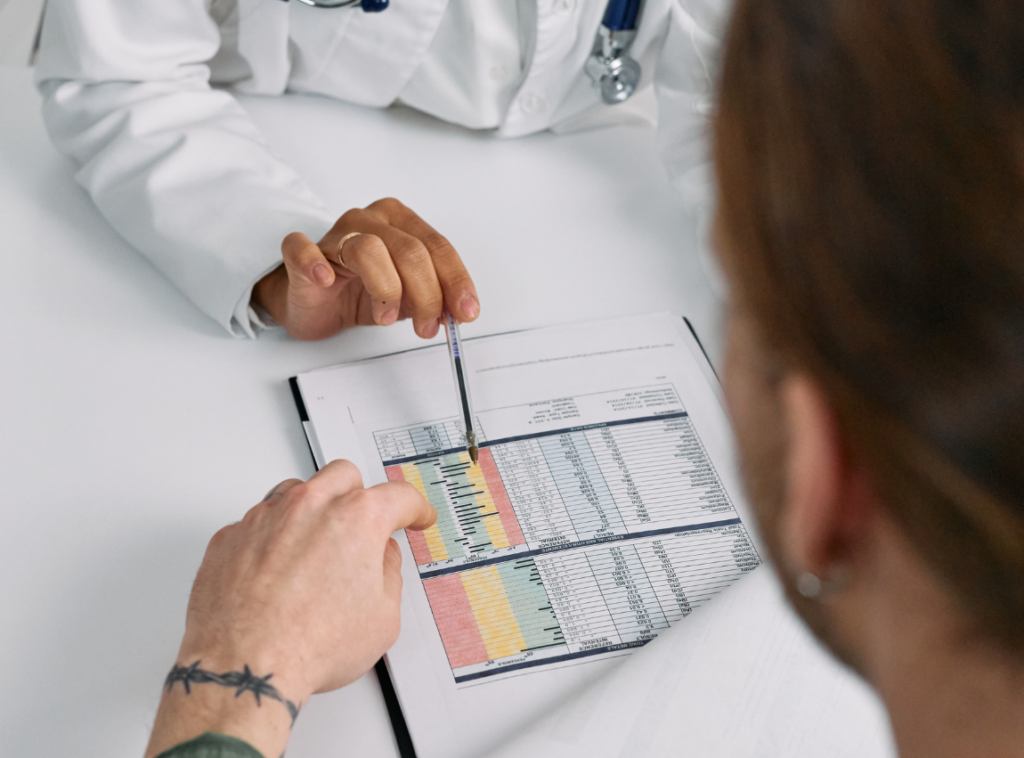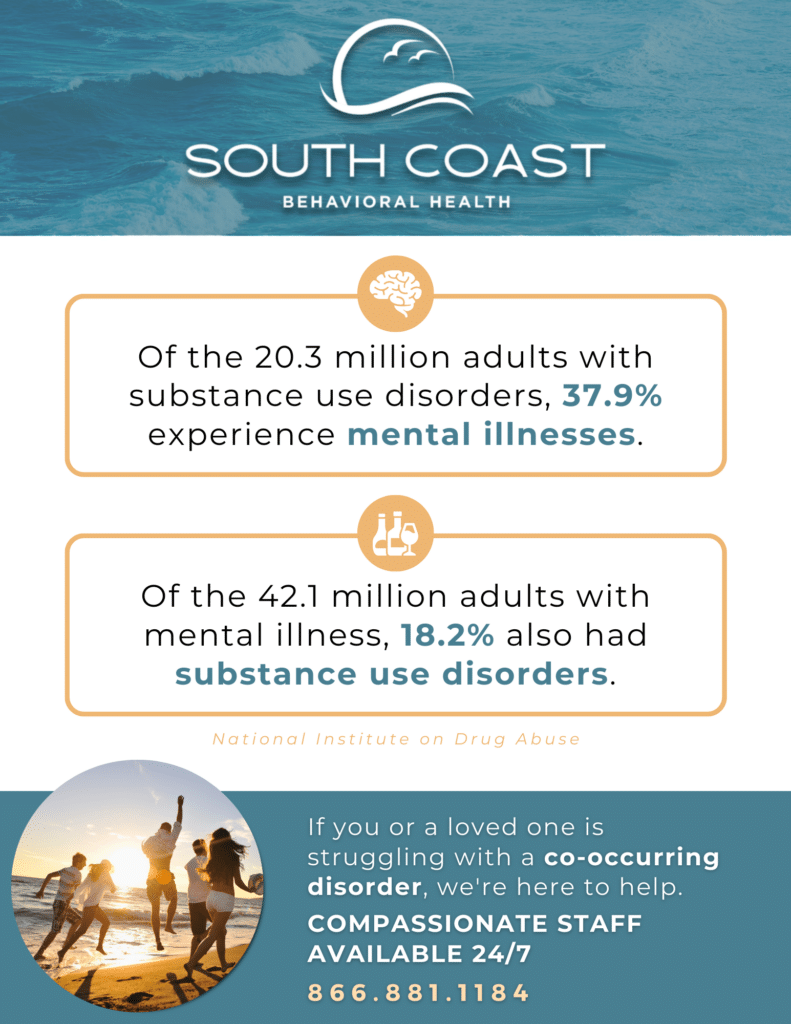Sometimes, people who have both mental health disorders and substance use disorders (SUDs) can pose a challenge to established treatment models. For this reason, people struggling to cope with untreated mental health conditions and substance abuse need specialized care. To address both issues, dual diagnosis treatment programs provide individualized evidence-based care to help you achieve long-term recovery.
Using new and improved diagnostic criteria, studies show that treating both illnesses is necessary for individuals to have the highest chance of success. In fact, dual-diagnosis treatment programs provide an integrated approach, ensuring that your personalized care plan meets your needs and goals for treatment and recovery.

What Is Dual Diagnosis?
Dual diagnosis is a term used to describe a person who has both a mental disorder and an alcohol or drug problem. Due to the effects of drug misuse on a person’s mental health, the phrase “dual diagnosis” is often used in addiction therapy and rehabilitation.
There are several ways to comprehend and identify a dual diagnosis. However, the only way to be certain is based on a healthcare professional’s evaluation of your symptoms. According to the DSM-5, you must meet several requirements before an accurate diagnosis can be given.
Upon entering treatment for drug and alcohol abuse, you will participate in medical assessments and mental health evaluations. After reviewing your results, your medical care team may find one or more co-occurring disorders. In these cases, it is best to get professional treatment from a licensed healthcare provider in a dual-diagnosis treatment center.
How Do Co-occurring Disorders Develop?
Mental health is impacted by substance abuse. For example, developing a drinking problem while dealing with depression may cause depression symptoms to worsen. Substance abuse often causes mental health disorders to worsen. For instance, a person with an anxiety disorder who starts abusing drugs may feel heightened feelings of worry and paranoia over time. According to research, people who have a substance use disorder or a mental health disorder are more likely to develop the other disorder compared to those who do not suffer from either.
We are open 24 hours per day, 7 days per week, 365 days per year.
Treatment for Dual Diagnosis
When a person suffers from a dual diagnosis, it can sometimes be difficult to find a facility that will treat addiction and mental health concerns concurrently. Often, people receive detoxification and counseling before they begin receiving treatment for their mental health issues. However, dual-diagnosis treatment centers assist you in overcoming both their drug issues and the symptoms of your mental illnesses.

- Thorough assessments and evaluations
- Personalized treatment plans
- Detoxification
- Inpatient Rehabilitation
- Continuing care services
- Psychotherapy and counseling
- Medication management
- Supportive Housing
- Support Groups
Treatment Programs for Co-occurring Disorders
Medical Detox
Detoxification is the first obstacle people with any substance abuse disorder will have to pass. Clients may receive medicines during a medical detox to control withdrawal symptoms and help wean themselves from drugs or alcohol. Once detox is complete, you can move on to inpatient rehabilitation.
Residential
Following detox, individuals who need more time to heal in intensive therapy than outpatient care can provide may receive extensive treatment through inpatient rehabilitation. Licensed professionals familiar with each illness in a dual diagnosis provide individualized care and group therapy sessions.
PHP and IOP
PHP and IOP combine medication management, peer support, and counseling to restore your physical, mental, and spiritual health. Dual diagnosis treatment provides you with additional insight into your mental health issues while teaching you how to instill relapse prevention skills outside of an inpatient facility.
Treatment Options for Co-occurring Disorders
At South Coast, we integrate mental health treatment within our substance abuse programming and provide an additional treatment plan focused on any mental health disorders our clients may have. This approach ensures that treatment of your substance use disorder and co-occurring disorders are addressed at the same time.

Mental Health Assessments
Thorough assessments and evaluations during admission help to identify any underlying mental health conditions. In providing this comprehensive approach enables staff and clients to collaborate in creating the most effective personalized treatment plan for their needs in recovery from substance abuse.

Medication Management
Symptoms of depression, anxiety, PTSD, or ADHD are common challenges for those in recovery. Medication management during rehab offers non-addictive medications to treat mental health disorders. These drugs can aid in stabilizing mood fluctuations, lowering stress, and enhancing focus.

Psychotherapy
A sizable portion of a successful treatment regimen includes psychotherapy. Counseling techniques such as cognitive behavioral therapy (CBT) help by teaching people with a dual diagnosis coping mechanisms. In turn, you can alter unhealthy thinking patterns, which may increase the risk of relapse.

Sober Living
Supportive housing can aid those who are newly sober or trying to prevent a relapse, like group homes or sober living houses. South Coast has many long-standing relationships within the community, so if you are looking for supportive housing options after treatment, our staff will happily assist you in your search.

Support Groups
Managing dual diagnosis may be difficult and isolating. However, members of support groups can share coping strategies, referrals to medical and mental health professionals, successes, and more. They can also provide community resources and valuable support so you know you are not alone.
Who Benefits From Dual Diagnosis Treatment?
People who are affected by co-occurring disorders often experience greater difficulty in their recovery. For this reason, those struggling with both mental health and substance use issues stand to gain the most from a dual-diagnosis treatment program.
Treatment for a dual diagnosis provides comprehensive support during recovery, addressing both the addiction issue as well as any co-occurring mental health disorder.
Dual diagnosis programs offer compassionate care tailored to the individual’s co-occurring mental health and substance use disorder needs which can lead to an increased chance of successful long-term recovery.
Both inpatient and outpatient treatment for co-occurring disorders benefit clients through medication, counseling, and other therapeutic services.

What Disorders Co-Occur with Substance Abuse?
The National Institute on Drug Abuse (NIDA) estimates that 50.5% of people with addiction also have other mental illnesses, such as anxiety and depression. Moreover, NIDA research suggests that approximately 25% of individuals who suffer from a serious mental illness also battle substance misuse or dependency problems in their life. These statistics highlight how common it is for those who struggle with addictions to have mental health conditions like insomnia or post-traumatic stress disorder.
In order to assist clients, a dual diagnosis rehab treats co-occurring mental illness and substance abuse at the same time.
Common co-occurring mental health disorders include:
- Depression
- Bipolar I and Bipolar II
- Generalized anxiety disorder
- Panic disorder
- Post-traumatic stress disorder (PTSD)
- Attention-deficit/hyperactivity disorder (ADHD)
- Borderline personality disorder (BPD)
- Antisocial personality disorder (ASPD)
- Schizophrenia
- Psychotic disorders
Although both substance use disorders and mental health disorders alone can cause great distress, people with these comorbid disorders can quit without worsening their mental health when they have appropriate support.
Common co-occurring physical health conditions include:
- Chronic pain
- Cancer
- Heart disease
- Liver disease
- Hepatitis C virus (HCV)
- HIV
Integrated Treatment for Co-occurring Disorders
Co-occurring disorders are prevalent in adulthood and many of these illnesses need a higher level of care. For this reason, it is best to use integrated care in a dual-diagnosis treatment program. Rehab programs that integrate mental and drug use disorder treatment improve the quality of care and health outcomes for those with co-occurring disorders by addressing the whole person.
Examples of dual-diagnosis clients may include those dealing with anxiety or depression resulting from their alcohol abuse. Other clients seek out dual diagnosis treatment for assistance with the symptoms of mental health disorders like schizophrenia that are exacerbated by drug abuse.
If you are currently struggling with the side effects of substance abuse and mental health disorders, dual-diagnosis treatment can help you recover. During treatment, our counselors will teach you how to cope with a variety of mental health disorders that may have contributed to or are a result of your substance abuse.
Wondering if Your Insurance Covers Dual Diagnosis Treatment?
Frequently Asked Questions
About Dual Diagnosis
Are Addiction and Mental Health Connected?
Substance misuse and mental health illnesses can both result in the development of the other. For instance, if you suffer from debilitating anxiety, you may begin abusing benzos to cope. Alternatively, if you regularly abuse alcohol, you may struggle with symptoms of depression such as persistent sadness, irritability, and lethargy.
As a result, co-occurring disorders can often pose a challenge when determining which condition manifests first. Depending on the individual in question, either condition may manifest first. Unfortunately, addiction is a common consequence of untreated mental health issues. For this reason, receiving treatment for both your mental health and substance use disorder can provide the comprehensive care and clarity you need to fully recover.
How Common Is Dual Diagnosis?
Dual diagnosis is common, even though it is not regularly discussed. It is estimated that 17 million adults in the U.S., or 6.7% of the adult population, are coping with a mental illness and a substance abuse disorder.
At What Age Does Dual Diagnosis Start?
People can become addicted to drugs at any age, and the same is true with mental illness. However, these issues frequently begin in the first few years of adolescence.
What Does Dual Diagnosis Mean?
Dual Diagnosis means that you have one or more diagnosable mental health disorders, in addition to your substance or alcohol use disorder.
A key part of understanding a dual diagnosis is viewing drug/alcohol abuse as a mental health disorder, because addiction to a substance is considered to be a disorder— as outlined in the Diagnostic and Statistical Manual of Mental Disorders. For example, if you have a generalized anxiety disorder or major depressive disorder, you would also have a dual diagnosis. This is because you can have more than one mental health disorder at the same time.
Why Can’t I Just Treat My Dependency?
Without addressing the additional causes of your struggle, treating your addiction will probably only have a temporary positive effect. Dependency does not develop spontaneously. It is best to receive comprehensive treatment from a licensed mental health and substance abuse professional for the symptoms of both disorders.

Dual Diagnosis Treatment at South Coast
South Coast offers services from detox through residential dual diagnosis rehab treatment. Within our continuum of care, all of our treatment plans focus on treating you and your individual needs. Our programs include detox, residential treatment, partial hospitalization, and intensive outpatient programs.
- Psychologists
- Medical professionals
- Nurses
- Licensed mental health professionals
Dual diagnosis is a complex condition that needs comprehensive treatment. Since the disorders can trigger one another, dealing with one disorder leaves leeway for the other to get worse because the disorders can stimulate one another. Oftentimes, people lose the ability to maintain mental clarity and order. As a result, our dual diagnosis treatment programs are effective because we treat both conditions at the same time.
Going through dual diagnosis treatment provides people with co-occurring disorders a new sense of hope. In treatment, our clients learn to develop positive coping skills over time which enable them to lead healthier lives. All of our behavioral health professionals dedicate their expertise to helping you achieve long-term recovery and well-being.
Get A Confidential Assessment From A Recovery Specialist
Dual Diagnosis Treatment Centers in California
As a dual diagnosis treatment provider in California, South Coast provides multiple treatment modalities and support from the moment you call us through the end of treatment. We understand it can be overwhelming to take the first step in seeking help for co-occurring disorders and addiction.
Irvine, CA
We provide treatment for dual diagnoses within our medical detox and residential treatment centers in Irvine, CA.
Huntington Beach, CA
We provide treatment for dual diagnoses within our medical detox and residential treatment centers in Huntington Beach, CA.
Costa Mesa, CA
We provide treatment for co-occurring disorders within our residential inpatient facility in Costa Mesa, CA.
Newport Beach, CA
We provide care for those with dual diagnoses within our PHP and IOP treatment facility in Newport Beach, CA.
Our treatment centers in California offer a wide range of services and dedicated addiction specialists who will help you begin your journey. We believe in empowering real people to get real, lasting results in recovery. Contact us today to get started!


